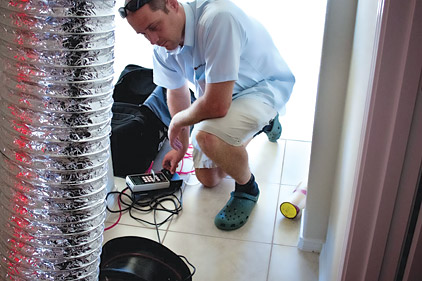
|
| A BPI-certified professional performs a duct leakage test. |
Consumers are concerned with saving energy in every walk of life, from the gasoline they use to fill their cars to the cost of providing a comfortable climate inside their homes. Due to consumer demand, manufacturers of autos, home appliances, and even office machinery are making more energy-efficient equipment.
While energy-efficient equipment certainly plays a role in reducing the cost of maintaining a comfortable living environment, the work of a knowledgable professional, with the ability to properly install and service such equipment, assess the whole home’s performance, and address the functionality of the controls may be just as important.
Many organizations are raising the bar of professionalism across the industry by offering certifications to individuals exhibiting a high degree of achievement in the field of energy-efficient homes.
NATE
“The North American Technician Excellence (NATE) believes that there is a great opportunity for HVACR contractors to further promote energy efficiency by adding home-performance services to their businesses,” said Valerie Briggs, director marketing and business development, NATE.
NATE’s interest in promoting the improvement of home energy performance is exhibited through a partnership with Residential Energy Services Network (RESNET). The organization is also offering a senior level HVAC efficiency analyst certification. “It tests a technician’s knowledge of the installation, service, maintenance, and repair of HVACR system operations (10 tons or less of air conditioning and 325,000 Btu or less heating capacity) to maintain high levels of energy efficiency,” Briggs said. “While all NATE’s specialty exams cover the basics of system performance and energy efficiency, NATE’s senior level efficiency analyst is dedicated to it.”
The test measures what 80 percent of HVAC efficiency analyst technicians have an 80 percent likelihood of encountering at least once during the year on a national basis. NATE strongly suggests that examinees have some formal training provided by an employer, a technical school, or other educational institution before taking the test.
And while there are no educational requirements one has to meet prior to taking the exam, the test taker must hold two NATE certifications in the following service specialties:
• Air conditioning plus one of the following: air distribution, gas heating, oil heating, hydronics gas, or hydronics oil; or
• Air distribution plus one of the following: air conditioning, gas heating, heat pump, oil heating, hydronics gas or hydronics oil; or
• Gas heating plus one of the following: air conditioning, air distribution, or heat pump; or
• Heat pump plus one of the following: air distribution, gas heating, oil heating, hydronics gas or hydronics oil; or
• Oil heating plus one of the following: air conditioning, air distribution, heat pump, hydronics gas or hydronics oil; or
• Hydronics gas plus one of the following: air conditioning, air distribution, or heat pump; or
• Hydronics oil plus one of the following: air conditioning, air distribution, or heat pump.
“NATE created the senior level HVAC efficiency analyst certification because it saw the growing demand for high efficiency from both consumers and government agencies,” said Briggs. “Technicians needed a way to demonstrate they could install and service high-efficiency systems. NATE created this rigorous exam to certify that knowledge.
“NATE certification tests represent real-world working knowledge of HVACR systems. Developed by a committee of industry experts nationwide, our exams cover HVACR topics pertinent to contractors, educators, manufacturers, and utilities alike,” she stated.
BPI
An organization committed to quality whole-home performance contracting, the Building Performance Institute Inc. (BPI), has a wide array of certifications that focus on residential energy auditing and energy-efficiency upgrades.
“Our certifications verify that workers have the house-as-a-system building-science knowledge, skills, and abilities necessary to diagnose and solve critical performance factors in a home that impact the comfort, health, and safety of occupants, and energy efficiency and durability of the home,” said Leslie McDowell, director of marketing and communications, BPI.
Some of BPI’s certifications are geared to HVAC contractors and installers. McDowell said someone who has earned the heating professional certification “optimizes the performance of heating equipment” within the whole-home context, and a person with the air conditioning/heat pump professional certification understands how those systems fit into the home as a whole and how to diagnose and correct problems to reach the goal of peak performance, said McDowell. Three other technical certifications — building analyst, air leakage control installer, and building envelope professional — are credentials for HVAC contractors and others “focused on whole-house performance work,” including contractors and installers in the home-performance, insulation, and window-installation trades; weatherization assistance program (WAP) techs; and general contractors, remodelers, and home inspectors.
In order to earn these five technical certifications, candidates must complete a written exam online and a field practical exam. There aren’t any prerequisites that must be met prior to test taking, but McDowell said that BPI has observed that “individuals completing training typically perform better on BPI exams.”
BPI also offers an accreditation credential to companies that meet rigorous criteria requirements. “BPI-accredited contracting companies agree to conform to BPI standards for all home-performance jobs. They maintain a BPI BA certification and one additional specialty certification for staff within their company. They participate in BPI’s quality assurance program, which provides random third-party inspections of contractor work, and annually reviews data-collection records and equipment. They maintain proof of registration, licensing, bonding, and insurance,” said McDowell.
For company accreditation, BPI expanded HVACR contractor eligibility criteria; it now recognizes NATE oil or gas service or installation certifications; National Oilheat Research Alliance (NORA) silver or gold certifications; and one of three member designations by RSES.
McDowell said, “BPI professional certification and accreditation has changed the way HVACR contractors approach both their projects and their customers. HVACR contractors are now aware that solutions to customer comfort and high utility costs go beyond the heating or cooling system and involve the whole house through air sealing, insulation, ventilation, and combustion safety.”
She said that when HVACR contractors address the whole house and solve customers’ comfort, health, and energy issues, they broaden the projects they can work on, reduce callbacks, and improve customer satisfaction. “This positions them as the experts for all improvements to the home the customer may want to undertake. It also improves the conversion rates of referrals from customers, and reduces the need for competitive bidding.”
ESCO Group
Another organization working to further the education and skills of technicians in the energy-efficiency and performance industries is ESCO Group, which currently has five energy-efficiency training and certification programs.
The green awareness training and certification program “provides a basic understanding of green concepts, terminology, systems, and the latest in green mechanical technologies,” said Reneé M. Tomlinson, director of strategic partnerships, ESCO Group. A green awareness certification can be earned in HVACR, electrical, and plumbing.
According to Tomlinson, the residential energy auditor curriculum is intended for educational institutions and industry training programs that want to implement a robust residential energy auditor training program. The 800-hour curriculum places extra emphasis on the HVAC system, the largest energy user in a home.
While certification is not a required component of the curriculum package, the program has been structured to include various certifications, including the residential energy auditor certification issued by the Green Mechanical Council, an affiliate of the ESCO Group, said Tomlinson. To earn the residential energy auditor certification, one must successfully achieve a passing score on three mandatory examinations, including two written examinations and a hands-on performance assessment.
The system performance training and certification program is intended to build upon the existing knowledge of students, technicians, and contractors by affirming they possess the required skills and competency to maximize energy efficiency. The program focuses on four principal performance aspects of HVAC systems that have an effect on energy consumption: airflow, critical refrigerant charging, psychrometrics, and combustion analysis, said Tomlinson. One can earn a system performance analyst certification in one or all disciplines.
With many states adopting the International Energy Conservation Code for new construction and major-renovation HVAC systems and ductwork, ESCO Group’s duct and envelope training and certification program makes certain participants are able to ascertain the leakage rate of a duct system and building’s thermal envelope, Tomlinson said. The certification testing consists of a written examination as well as a hands-on performance evaluation.
The residential heat load analyst training program is intended for schools and industry training programs that want to ensure that participants have a full understanding of heat gain or heat loss calculations. Certification can be utilized for students completing the training or by technicians and contractors who need to demonstrate competency.
“This program was initially developed as a component of the residential energy auditor curriculum package, however, the importance of performing heat gain and heat loss calculations on a structure when installing a new HVAC system or performing an energy audit justified the program’s release as a standalone training and certification program,” said Tomlinson.
ESCO Group saw the industry moving down the path of energy efficiency, energy auditing, and green technologies and has been witnessing “HVACR contractors gradually shifting into performance contracting,” said Tomlinson.
“Because much of what is involved in an energy audit, other energy upgrades, and changes within a structure revolves around the heating and cooling system, it only makes sense that HVACR contractors and technicians obtain the skills necessary to add these additional pieces to their service offerings.”
Publication date: 6/3/2013
Want more HVAC industry news and information? Join The NEWS on Facebook, Twitter, and LinkedIn today!







